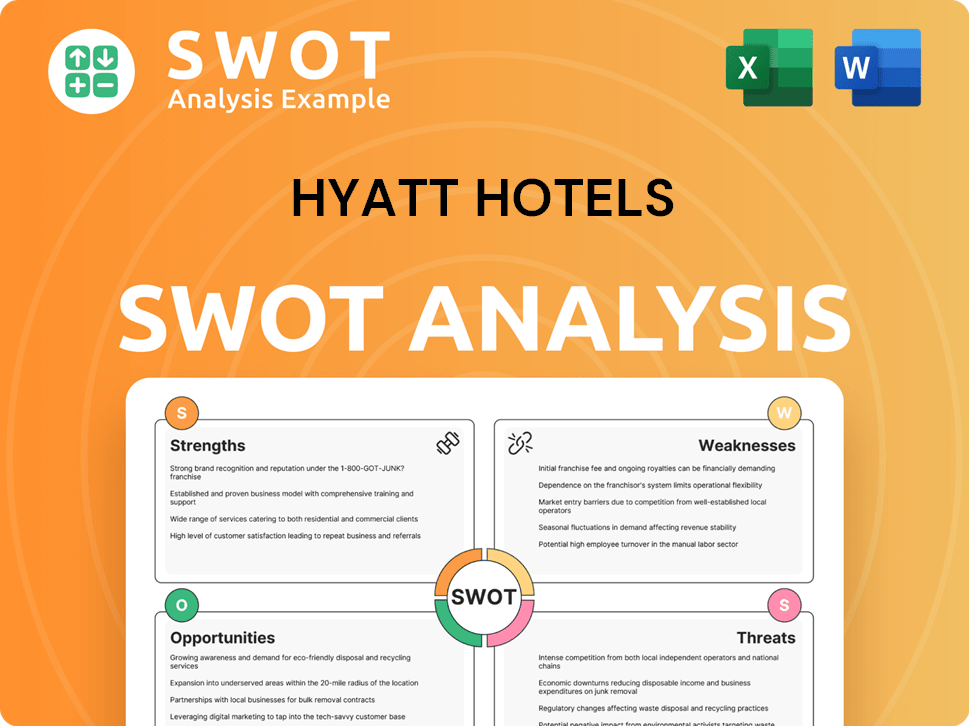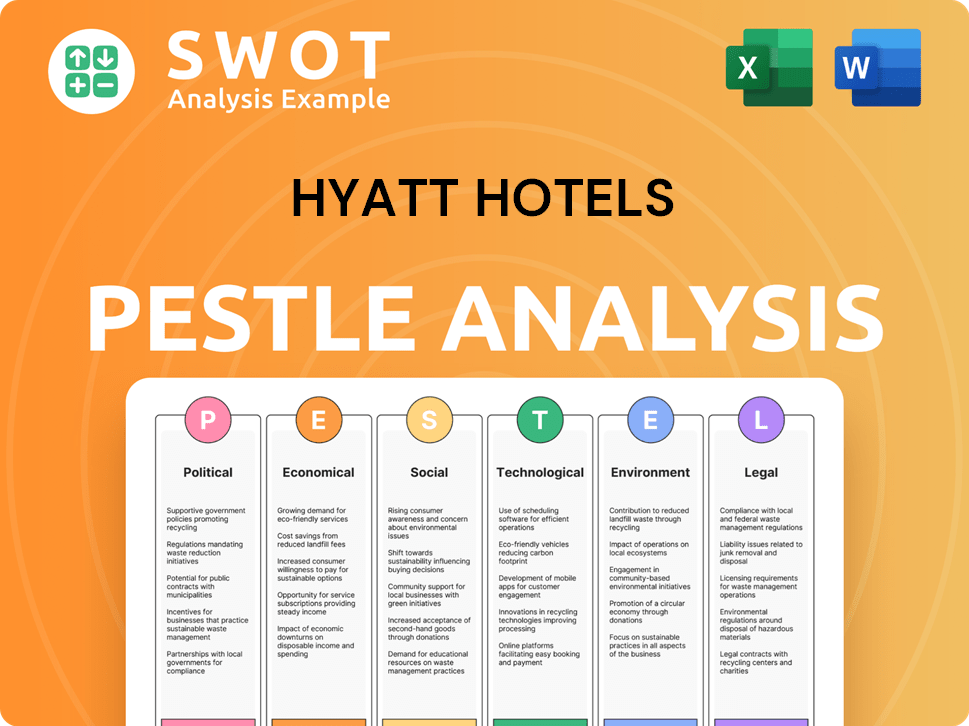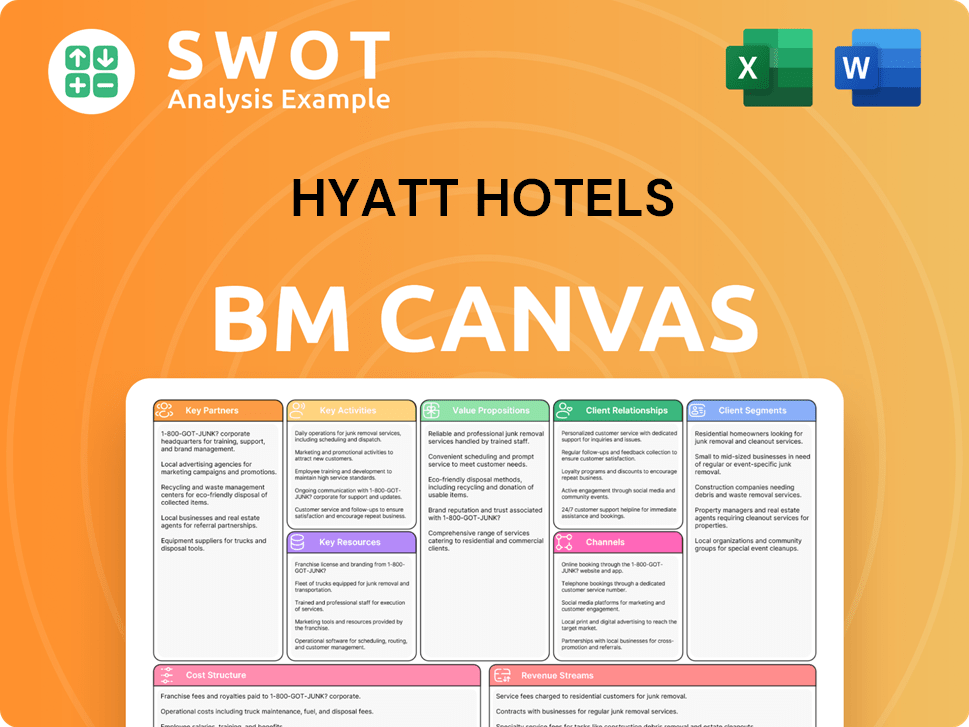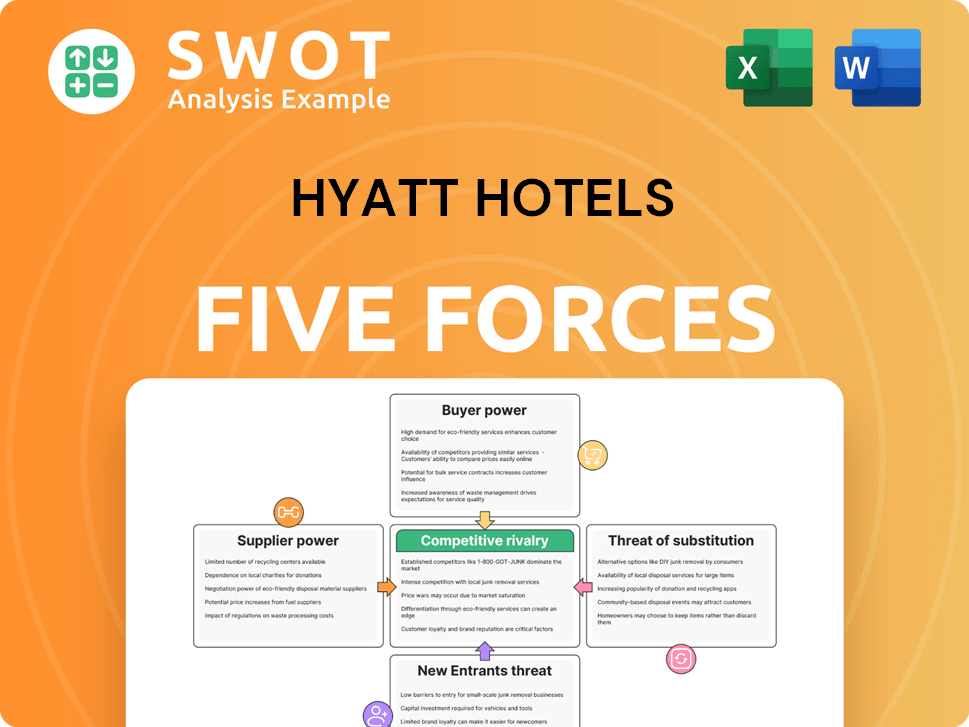Hyatt Hotels Bundle
How Does Hyatt Hotels Company Thrive in the Global Market?
Hyatt Hotels Corporation, a titan in the hospitality industry, boasts a vast portfolio of managed, franchised, owned, and developed properties worldwide. Its strategic acquisitions, including Two Roads Hospitality and Apple Leisure Group, have significantly expanded its reach, particularly in the luxury, lifestyle, and all-inclusive resort sectors. With a presence in over 77 countries, understanding Hyatt Hotels SWOT Analysis is key to grasping its operational intricacies and market positioning.

This exploration into How Hyatt Works will uncover the company's operational strategies, diverse revenue streams, and competitive advantages within the dynamic global hospitality industry. From its iconic Hyatt brands to its innovative business model, we'll examine how Hyatt Company generates value and navigates the evolving landscape of travel and tourism. Whether you're an investor, a traveler, or an industry analyst, gain valuable insights into Hyatt's success.
What Are the Key Operations Driving Hyatt Hotels’s Success?
The Hyatt Hotels Corporation operates through a multifaceted approach, focusing on managing, franchising, owning, and developing a diverse portfolio of hotels, resorts, and residential properties. This strategy allows the Hyatt Company to cater to various customer segments, including leisure and business travelers, through its luxury, lifestyle, and select service brands. Its operational framework is supported by a global infrastructure that manages property operations, brand standards, technology integration, and customer service.
How Hyatt works involves meticulous property selection and development, ensuring each location aligns with brand standards and target markets. For managed properties, Hyatt oversees daily operations, guest services, and marketing, maintaining a consistent brand experience. The franchise model provides its brand name, reservation systems, and operational support to independent hotel owners. This asset-light strategy helps expand its global reach while reducing capital expenditure. Hyatt also owns properties, offering direct operational control and serving as showcases for its brands.
Key operational strengths include a robust global supply chain, advanced technology platforms for reservations and guest management, and extensive sales channels. The World of Hyatt loyalty program is central to its value proposition, fostering customer loyalty through tiered benefits and exclusive offers. Strategic acquisitions, such as Apple Leisure Group, have significantly expanded its presence in the all-inclusive resort segment. These capabilities translate into elevated service, diverse accommodation options, and a seamless travel experience, differentiating Hyatt through a premium brand image and a loyal customer base.
Hyatt's business model is built on a mix of owned, managed, and franchised properties. This diversification allows for global expansion with varying levels of capital investment. The focus on luxury and lifestyle brands enables higher average daily rates and revenue per available room.
Hyatt operates across various segments, including luxury, lifestyle, and select service. Some of the Hyatt brands include Park Hyatt, Grand Hyatt, Hyatt Regency, and Hyatt Place. This diverse portfolio caters to a wide range of travelers and preferences.
Operational processes include property selection, development, and management. For managed properties, Hyatt oversees daily operations, ensuring brand consistency. Franchising offers a lower-risk expansion strategy, while owned properties provide direct control.
Hyatt offers elevated service, diverse accommodation options, and a seamless travel experience. The World of Hyatt loyalty program fosters customer loyalty through personalized benefits and exclusive offers. This focus differentiates the company in the market.
Hyatt's operational strengths include a global supply chain, advanced technology platforms, and extensive sales channels. The loyalty program and strategic acquisitions enhance its market position. These elements contribute to its financial performance and customer satisfaction.
- Global Supply Chain: Ensures efficient procurement of goods and services.
- Technology Platforms: Facilitate seamless reservations and guest management.
- Sales Channels: Include website, global sales teams, and third-party online travel agencies.
- Loyalty Program: World of Hyatt fosters customer loyalty and provides personalized experiences.
In 2024, Hyatt reported a significant increase in its global footprint, with a focus on expanding its luxury and lifestyle brands. The company's strategic acquisitions and its asset-light approach through franchising have been key drivers of its growth. For more details on the company's structure, you can explore the information on Owners & Shareholders of Hyatt Hotels.
Hyatt Hotels SWOT Analysis
- Complete SWOT Breakdown
- Fully Customizable
- Editable in Excel & Word
- Professional Formatting
- Investor-Ready Format

How Does Hyatt Hotels Make Money?
The Hyatt Hotels Corporation's revenue model is built on a diversified approach, encompassing various streams to maximize profitability. The company leverages its brand recognition and operational expertise through a combination of owned assets, management contracts, and franchise agreements. This strategy allows for both direct revenue generation and asset-light expansion, contributing to a resilient financial structure.
Understanding how Hyatt Hotels generates revenue is crucial for investors and stakeholders. The company's ability to adapt and diversify its revenue streams, particularly through strategic acquisitions and loyalty programs, positions it well within the competitive hospitality industry. This chapter will delve into the specifics of Hyatt's financial performance and monetization strategies.
In 2023, Hyatt reported total revenues of approximately $6.7 billion, showcasing its significant presence in the global hospitality market. This figure highlights the effectiveness of its revenue-generating strategies and its ability to maintain financial health.
The primary revenue streams for Hyatt include management and franchise fees, revenue from owned and leased hotels, vacation ownership and residential sales, and the contributions from the Apple Leisure Group (ALG). These streams are key to understanding the Hyatt business model and its financial performance.
- Management and Franchise Fees: This is a core component of Hyatt's revenue, derived from managing properties for third-party owners and franchising its brands. These fees often include a base fee based on gross revenues and an incentive fee tied to profitability. This asset-light model supports expansion with less capital.
- Owned and Leased Hotels: Revenue from these hotels comes from room sales, food and beverage, and other services. This segment allows Hyatt to directly control the guest experience and showcase its brand standards.
- Vacation Ownership and Residential: Hyatt generates revenue from timeshare sales and related services, as well as from residential properties associated with its brands. This segment provides additional revenue streams and enhances brand loyalty.
- Apple Leisure Group (ALG): The acquisition of ALG has significantly diversified Hyatt's revenue, adding tour operating, destination management, and loyalty program revenues, especially within the all-inclusive resort segment. This expansion has broadened Hyatt's customer reach.
The company employs several strategies to monetize its services and enhance customer loyalty. The World of Hyatt loyalty program, with its tiered pricing, is a key element. The company also focuses on cross-selling opportunities, such as promoting vacation ownership to hotel guests. The strategic shift towards management and franchise fees provides a more stable revenue base. To learn more about Hyatt's strategic approach, see Growth Strategy of Hyatt Hotels.
- Loyalty Program: The World of Hyatt program encourages repeat business through tiered benefits, driving customer loyalty and repeat stays.
- Cross-Selling: Promoting vacation ownership and other services to existing guests increases revenue per customer.
- Asset-Light Strategy: Focusing on management and franchise agreements reduces capital requirements and provides a more predictable revenue stream. This strategy has been key to Hyatt's expansion.
- Strategic Acquisitions: The integration of ALG has broadened its customer base and revenue streams, particularly in the leisure and all-inclusive segments.
Hyatt Hotels PESTLE Analysis
- Covers All 6 PESTLE Categories
- No Research Needed – Save Hours of Work
- Built by Experts, Trusted by Consultants
- Instant Download, Ready to Use
- 100% Editable, Fully Customizable

Which Strategic Decisions Have Shaped Hyatt Hotels’s Business Model?
The evolution of Hyatt Hotels Corporation has been marked by strategic acquisitions and operational adjustments, significantly impacting its structure and market position. Key milestones include the acquisition of Two Roads Hospitality in 2018, which expanded its luxury and lifestyle portfolio. Another pivotal move was the acquisition of Apple Leisure Group (ALG) in 2021, which broadened its leisure travel offerings and diversified revenue streams.
These strategic moves have been crucial in shaping the company's ability to cater to diverse traveler segments and navigate industry challenges. The company has also focused on adapting to changing market conditions and guest expectations, particularly in the face of global events like the pandemic. This includes implementing enhanced health protocols and flexible booking policies.
Hyatt's competitive edge is built on several pillars, including strong brand recognition, particularly in the luxury and upper-upscale segments, and a robust loyalty program. The emphasis on an asset-light business model and the integration of ALG have further strengthened its position in the market. These factors have allowed the company to expand its global footprint and maintain a competitive advantage.
A significant milestone was the acquisition of Two Roads Hospitality in 2018, which added brands like Alila and Thompson Hotels. The purchase of Apple Leisure Group (ALG) in 2021 for $2.7 billion was another transformative move, expanding its presence in the all-inclusive resort segment. These acquisitions have broadened the scope of Hyatt's offerings and increased its market reach.
Hyatt has strategically focused on an asset-light model, increasing the proportion of management and franchise agreements. This approach reduces capital intensity and provides more stable revenue streams. The company has also invested in technology to improve guest experiences and is expanding into new markets. For instance, Hyatt announced plans to open over 50 new hotels in 2024.
Hyatt's strong brand strength in the luxury and upper-upscale segments allows it to command premium pricing and foster customer loyalty. The World of Hyatt loyalty program drives repeat business and provides valuable customer data. The integration of ALG has provided a strong foothold in the lucrative all-inclusive segment. The company's focus on sustainability and seamless guest experiences also contributes to its competitive advantage.
The hospitality industry faced significant challenges during the global pandemic, including reduced travel and operational restrictions. Hyatt responded by implementing enhanced cleanliness protocols and flexible cancellation policies. The company also focused on managing costs and preserving liquidity during this downturn. These measures helped the company navigate the crisis.
In 2023, Hyatt reported a net income of $1.2 billion. The company's asset-light strategy is evident in its portfolio; as of December 31, 2023, approximately 80% of its hotels were managed or franchised. The World of Hyatt loyalty program has over 36 million members, driving significant repeat business. The company's expansion plans include opening over 50 new hotels in 2024 across its luxury, lifestyle, and resort brands, illustrating its commitment to growth and market diversification. You can learn more about the company's structure in this article about How Hyatt Hotels Works.
- Hyatt's net income in 2023 was $1.2 billion.
- Approximately 80% of Hyatt's hotels are managed or franchised.
- The World of Hyatt loyalty program has over 36 million members.
- Hyatt plans to open over 50 new hotels in 2024.
Hyatt Hotels Business Model Canvas
- Complete 9-Block Business Model Canvas
- Effortlessly Communicate Your Business Strategy
- Investor-Ready BMC Format
- 100% Editable and Customizable
- Clear and Structured Layout

How Is Hyatt Hotels Positioning Itself for Continued Success?
Hyatt Hotels Corporation holds a strong position in the global hospitality sector, particularly in the luxury and upper-upscale segments. While not the largest in terms of total rooms, Hyatt distinguishes itself through its curated portfolio of high-end brands and its focus on personalized guest experiences. As of early 2024, the World of Hyatt loyalty program had 44 million active members. The company's footprint includes over 1,300 properties across 77 countries, demonstrating its widespread presence.
Hyatt faces risks such as economic downturns, geopolitical instability, and shifts in consumer preferences. Competition from other global hotel chains and online travel agencies also puts pressure on pricing. Moreover, operational challenges like labor shortages and supply chain disruptions are significant concerns. These factors can impact occupancy rates and average daily rates, affecting the financial performance of the Hyatt Company.
Hyatt is a key player in the luxury and upper-upscale hotel segments. It differentiates itself through its focus on high-end brands and personalized guest experiences. The company's strong brand portfolio and loyalty program contribute to its market share and customer loyalty.
Economic downturns, geopolitical instability, and changing consumer preferences pose risks. Intense competition from other hotel chains and online travel agencies affects pricing. Operational challenges, including labor shortages and supply chain disruptions, also present significant hurdles for the company.
Hyatt is focused on asset-light growth through management and franchise agreements. Expansion in leisure and all-inclusive segments is a priority, building on the success of the Apple Leisure Group acquisition. Technology investment and sustainability initiatives are also key components of its strategy.
The company plans to open over 50 new hotels across its luxury, lifestyle, and resort brands in 2024. Hyatt emphasizes leveraging its loyalty program to drive direct bookings and repeat business. The company is dedicated to adapting to market dynamics and managing costs.
Hyatt is pursuing an asset-light strategy, focusing on management and franchise agreements to expand its global reach. This approach allows for broader expansion with reduced capital expenditure. The company is also expanding its presence in the leisure and all-inclusive sectors.
- Expansion of hotel brands in 2024.
- Increased focus on the all-inclusive segment.
- Investment in technology to improve guest experience.
- Commitment to sustainability and cost management.
Hyatt's future success depends on adapting to changing market conditions and consumer preferences. The company's ability to maintain its brand image, manage costs, and effectively leverage its loyalty program will be crucial. To better understand the ideal customer, consider exploring the Target Market of Hyatt Hotels.
Hyatt Hotels Porter's Five Forces Analysis
- Covers All 5 Competitive Forces in Detail
- Structured for Consultants, Students, and Founders
- 100% Editable in Microsoft Word & Excel
- Instant Digital Download – Use Immediately
- Compatible with Mac & PC – Fully Unlocked

Related Blogs
- What are Mission Vision & Core Values of Hyatt Hotels Company?
- What is Competitive Landscape of Hyatt Hotels Company?
- What is Growth Strategy and Future Prospects of Hyatt Hotels Company?
- What is Sales and Marketing Strategy of Hyatt Hotels Company?
- What is Brief History of Hyatt Hotels Company?
- Who Owns Hyatt Hotels Company?
- What is Customer Demographics and Target Market of Hyatt Hotels Company?
Disclaimer
All information, articles, and product details provided on this website are for general informational and educational purposes only. We do not claim any ownership over, nor do we intend to infringe upon, any trademarks, copyrights, logos, brand names, or other intellectual property mentioned or depicted on this site. Such intellectual property remains the property of its respective owners, and any references here are made solely for identification or informational purposes, without implying any affiliation, endorsement, or partnership.
We make no representations or warranties, express or implied, regarding the accuracy, completeness, or suitability of any content or products presented. Nothing on this website should be construed as legal, tax, investment, financial, medical, or other professional advice. In addition, no part of this site—including articles or product references—constitutes a solicitation, recommendation, endorsement, advertisement, or offer to buy or sell any securities, franchises, or other financial instruments, particularly in jurisdictions where such activity would be unlawful.
All content is of a general nature and may not address the specific circumstances of any individual or entity. It is not a substitute for professional advice or services. Any actions you take based on the information provided here are strictly at your own risk. You accept full responsibility for any decisions or outcomes arising from your use of this website and agree to release us from any liability in connection with your use of, or reliance upon, the content or products found herein.